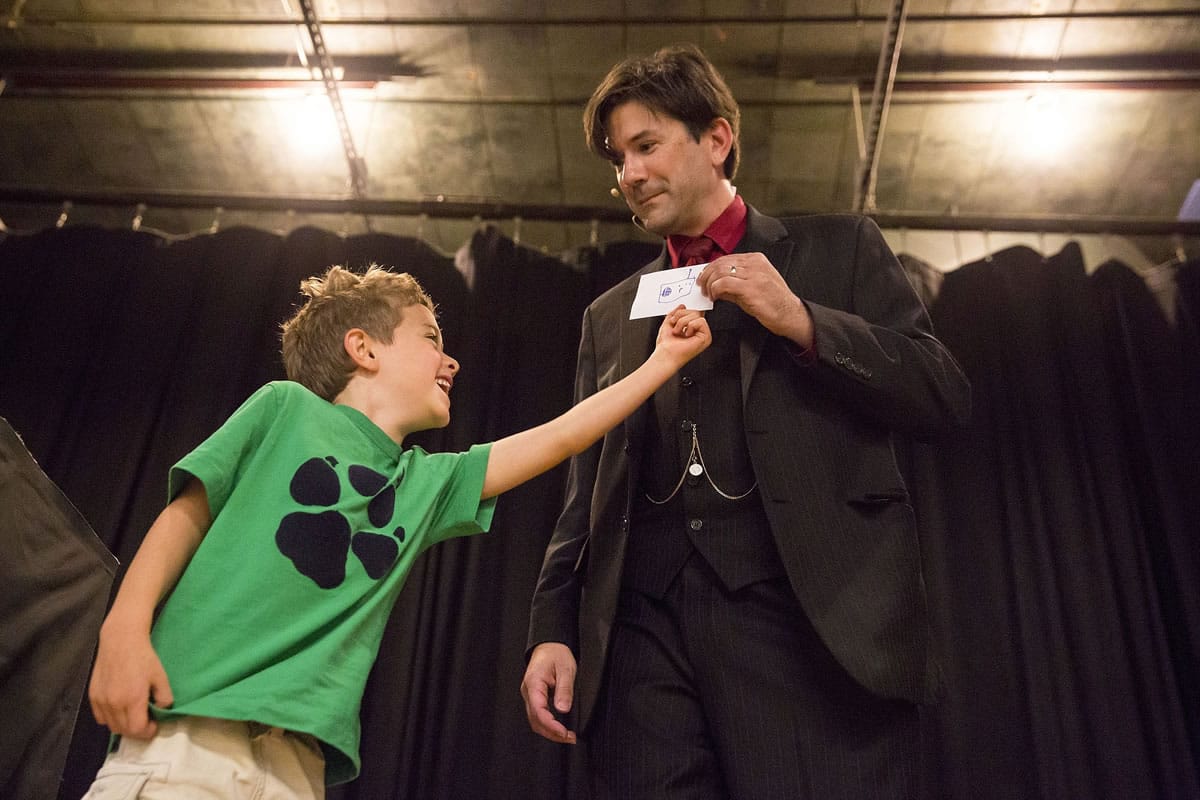SEATTLE — At a reported $800 million net worth, David Copperfield sits at the very top of the 9,000 U.S. members of the International Brotherhood of Magicians.
Then the earnings list goes rapidly down to those playing small clubs and corporate events. Ninety percent of magicians, perhaps even 95 percent, don’t make a full-time living at this craft they love.
They have day jobs or are retired or are labeled “hobbyists,” says their association.
Evan Reynolds, 44, a software programmer in downtown Seattle, is in that latter category.
But for those who perform for free in community theater, just like the musicians who play for $50 a night at some tavern, you gotta follow your passion.
“I like the concept of wonder,” Reynolds says. “I like practicing a trick on my sofa for a month, and then you show it to somebody and it actually works. It’s kind of cool.”
Half a year ago, Reynolds had this big concept of putting on monthly family variety shows with jugglers, magicians and other performers, and selling cheap tickets, like $5 for kids and $10 for adults.
It has been a laudable but mostly money-losing venture.
A recent Sunday afternoon at the Phinney Center Community Hall, located in a former elementary school, was no exception.
By the time Reynolds added up the $260 auditorium rental fee, nominal fees (and they were nominal) for the performers, and such costs as $100 for posters to spread the word, the show was at a deficit because of those $5 and $10 tickets.
Still, Reynolds did end up making 100 children and adults very happy.
When after the show, you have a kid such as Grey Zakae, 9, imitating a palming trick for his sister, Jillian, 7, you know you’ve connected with the audience.
It was not a computer game, and not a video.
That was Reynolds making a bowl of water appear from inside a straitjacket.
That was juggler Nickolai Pirak doing incredible feats of tossing and catching balls in constant motion; and humor magician Ruben Barron fooling the audience with a disappearing ball trick; and the self-advertised “renegade” punkish Chaotic Noise Marching Corps leading the audience out into the parking lot.
World of constant hustle
In the world of magicians, you always have to be hustling.
Louie Foxx, 36, is a Seattle-based magician who’s in that rare category of making a good, full-time living at it.
He figures he does 400 shows a year throughout the country, sometimes three in one day.
Then it’s on to the next gig.
“At the end of the day, you’re out of contract, unemployed. It’s not that I have one boss, I have 300 bosses that I have to keep happy,” says Foxx.
“Sometimes, you’ve been working with one event planner for 12 years, and they love your show. Then they retire or switch jobs, and whoever replaced that person doesn’t like magicians. And I don’t have sick leave. I get up sick and what do I do? Luckily, I have a network of guys who I trust who I can call to do the show.”
And you always have to give the audiences something new.
Sheila Lyon and her husband, Darryl Beckman, own the Market Magic & Novelty Shop in Pike Place Market. For more than three decades, Lyon has had fortunetelling acts for special events.
She’s quitting the act.
“You always have to reinvent yourself in this business. New presentation, new website. I’m tired. I don’t want to do that again,” says Lyon.
By the time you average in the lower-paid ones, the job site SimplyHired.com figures, the average magician’s salary in Seattle is $35,000 a year, higher than the nationwide average of $29,000 a year.
It’s not for the big bucks that you go into this craft.
“You ask any magician, and they’ll tell you that the big payoff is the look on spectators’ faces, the look of astonishment. That’s the high. You’re taking something bordering on the impossible, and making it happen,” says Jay Boiselle, owner of the Seattle Juggling & Magic Shop.
The magicians association has 150 members in this state, and Boiselle figures a dozen of them make their living at it.
It has always been a mostly male endeavor, and Boiselle says he doesn’t quite understand why.
“Maybe it’s a matter of exposure. Boys get a magic kit, girls are off doing crafts,” he says.
In many ways, Evan Reynolds is pretty typical of those who take up magic. Growing up in Virginia, his dad was an amateur magician, and sometimes fellow magicians would come to the home.
By middle school, Reynolds was checking out magic books from the library and learning card tricks.
These days, Reynolds sets up a video camera to record a card trick, with the camera set up at the same angle as an audience spectator would be looking.
His magic skills grew enough that he got a job working for $50 and meals at the Sunday brunch crowd at an Atlanta restaurant.
That led to gigs at birthday parties and corporate events, which he cut back once his kids came along.
But moving to Seattle three years ago, Reynolds kept alive his dream of that family variety show at low ticket prices.



